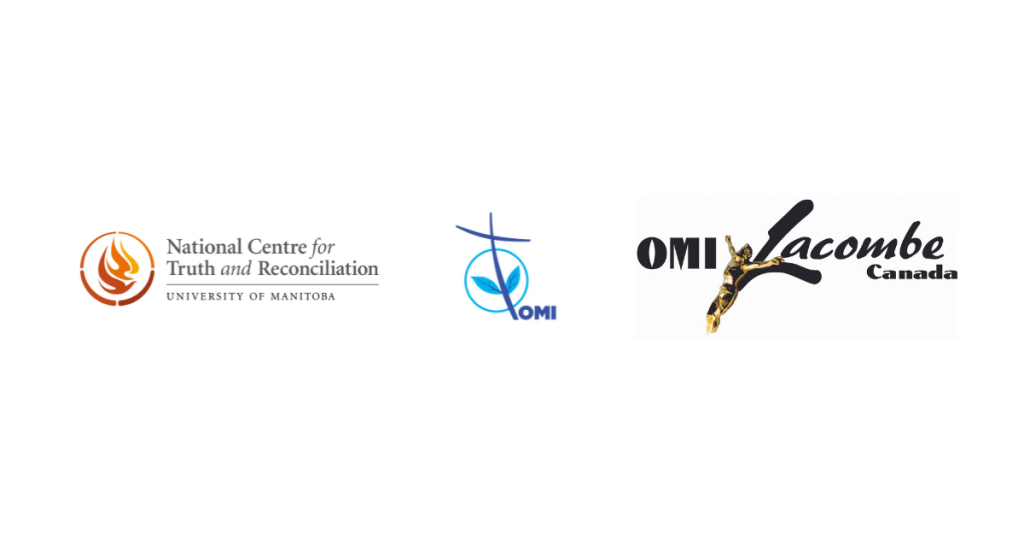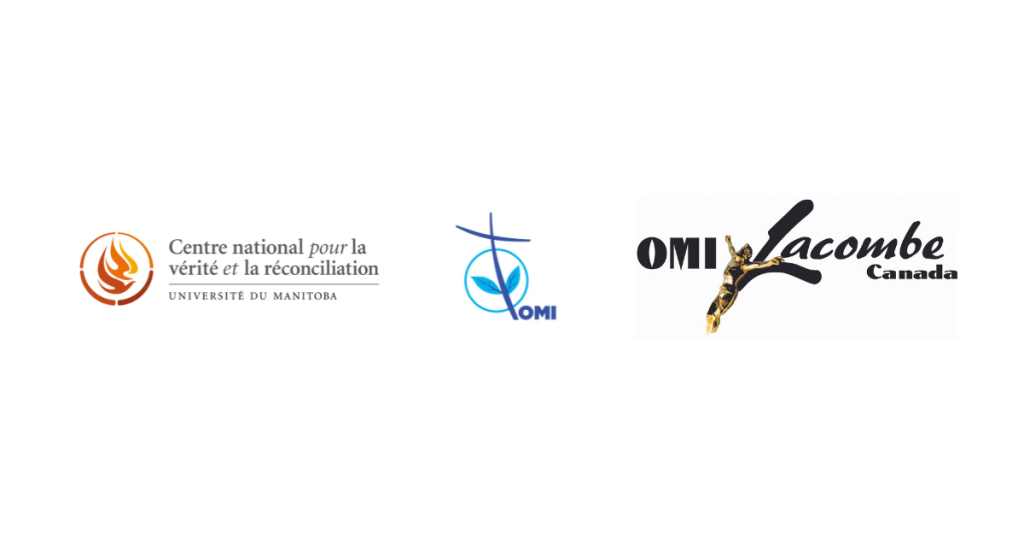JOINT STATEMENT

FOR IMMEDIATE RELEASE:
March 22, 2022
Update from the National Centre for Truth and Reconciliation and the Missionary Oblates of Mary Immaculate
In advance of the historic delegation of Indigenous Peoples to the Holy See, the National Centre for Truth and Reconciliation (NCTR) and the Missionary Oblates of Mary Immaculate are continuing efforts to ensure all relevant residential school records are available to Survivors, their families, their communities, and all Canadians.
As announced in December 2021, the Missionary Oblates of Mary Immaculate have agreed to provide the NCTR full access to residential school records which may be held in the Oblate archive in Rome, Italy. These might include letters written by early Oblate missionaries to Oblate leaders in France or Rome. Work is ongoing to arrange an initial visit to the archive this Spring by Mr. Raymond Frogner, Head Archivist for the NCTR.
The Missionary Oblates of Mary Immaculate also continue to provide records to the NCTR on an ongoing basis from four archives located across the country. The Oblates have provided new funding for additional archivists, and to date has provided more than 40,000 records to the NCTR. Work is ongoing to identify and process additional files including the digitization and transfer of handwritten entries from Oblate missionaries, known as Codex Historicus.
The NCTR and Missionary Oblates of Mary Immaculate share a belief that a truthful account of residential school history is an essential foundation for healing for Survivors, their families and communities, and our nations.
The Oblates operated 48 residential schools in Canada, including the Marieval Indian Residential School in Cowessess First Nation and Kamloops Indian Residential School in Tk’emlúps te Secwépemc First Nation, and several others where unmarked graves have recently been identified.
These types of records are a critical component of the process that communities are currently undertaking to search former residential school sites, and may help to better understand the historical context of unmarked graves.
We will continue to provide updates on this important collaboration as work progresses.
-30-
About the NCTR
The National Centre for Truth and Reconciliation (NCTR) was created to preserve the memory of Canada’s Residential School system and legacy. Not just for a few years, but forever. It is the responsibility of the NCTR to steward and share the truths of Survivors’ experiences in a respectful way and to work with Indigenous and non-Indigenous educators, researchers, communities, decision-makers and the general public to support the ongoing work of Truth, Reconciliation and healing across Canada and beyond.
About the Missionary Oblates of Mary Immaculate
The Missionary Oblates of Mary Immaculate were founded in 1816 by St. Eugene de Mazenod in Aix en Provence, France. The community arrived in Canada in 1841. After their arrival, Oblate priests and brothers worked across Canada and throughout the far north in a variety of areas including, residential schools, parish and retreat ministry, and hospital and prison chaplaincies. OMI Lacombe Canada Province is based in Ottawa, ON, and Notre‐Dame‐du‐Cap Province is based in Richelieu QC.
For more information:
NCTR: media@mediastyle.ca
OMI Lacombe Canada Province: information@omilacombe.ca
Notre‐Dame‐du‐Cap Province : provincial@omiquebec.com

POUR PUBLICATION IMMÉDIATE
22 mars 2022
Mise à jour du Centre national pour la vérité et la réconciliation et des Missionnaires Oblats de Marie Immaculée
En prévision de la délégation historique des peuples autochtones au Saint-Siège, le Centre national pour la vérité et la réconciliation (CNVR) et les Missionnaires Oblats de Marie Immaculée poursuivent leurs efforts pour s’assurer que tous les documents pertinents en lien aux pensionnats indiens sont à la disposition des survivants, de leurs familles, de leurs communautés et de tous les Canadiens.
Tel qu’annoncé en décembre 2021, les Missionnaires Oblats de Marie Immaculée ont accepté de fournir au CNVR un accès complet aux documents des pensionnats indiens qui pourraient être conservés dans les archives des Oblats à Rome, en Italie. Parmi ces documents, on pourrait y retrouver des lettres écrites par les premiers missionnaires oblats aux dirigeants oblats en France ou à Rome. Des préparatifs sont en cours pour organiser une première visite du site des archives ce printemps par M. Raymond Frogner, archiviste en chef du CNVR.
Les Missionnaires Oblats de Marie Immaculée continuent également de fournir des documents au CNVR à partir de quatre sites d’archives à travers le pays. Les Oblats ont alloué de nouveaux fonds pour d’autres archivistes et, à ce jour, ont fourni plus de 40 000 documents au CNVR. Des travaux sont en cours pour identifier et traiter des documents supplémentaires, y compris la numérisation et le transfert d’inscriptions manuscrites de missionnaires oblats, connus sous le nom de codex historique.
Le CNVR et les Missionnaires Oblats de Marie Immaculée partagent la conviction qu’un compte rendu véridique de l’histoire des pensionnats indiens est un fondement essentiel pour la guérison des survivants, de leurs familles et de leurs communautés, et de nos nations.
Les Oblats exploitaient 48 pensionnats indiens au Canada, dont le pensionnat indien Marieval dans la Première Nation de Cowessess et le pensionnat indien de Kamloops dans la Première Nation de Tk’emlúps te Secwépemc, et plusieurs autres où des tombes non marquées ont récemment été identifiées.
Ces types de documents sont un élément essentiel du processus que les collectivités entreprennent actuellement pour fouiller les anciens sites des pensionnats indiens, et peuvent aider à mieux comprendre le contexte historique des tombes non marquées.
Nous continuerons de fournir des mises à jour sur cette importante collaboration tout au long de la progression des travaux.
-30-
À propos du CNVR
Le Centre national sur la vérité et la réconciliation (CNVR) a été créé pour préserver la mémoire du système et de l’héritage des pensionnats indiens du Canada. Pas seulement pour quelques années, mais pour toujours. Il est de la responsabilité du CNVR de gérer et de partager les vérités des expériences des survivants d’une manière respectueuse et de travailler avec les éducateurs, les chercheurs, les communautés, les décideurs et le grand public autochtones et non autochtones pour soutenir le travail continu de vérité, réconciliation et guérison partout au Canada et au-delà.
À pros des Missionnaires Oblats de Marie Immaculée
La communauté des Missionnaires Oblats de Marie Immaculée a été fondée en 1816 par Saint Eugène de Mazenod à Aix en Provence, France. La communauté s’est installée au Canada en 1841. Après son arrivée, des prêtres et frères oblats ont travaillé partout au Canada et dans tout le Grand Nord dans divers secteurs, y compris les pensionnats, les ministères paroissiaux et de retraite, ainsi que les aumôneries d’hôpitaux et de prisons. La Province oblate OMI Lacombe Canada est basée à Ottawa, en Ontario, et la Province oblate Notre‐Dame‐du‐Cap est basée dans le Richelieu, au Québec
Pour plus d’information :
CNVR : media@mediastyle.ca
Province oblate OMI Lacombe Canada : information@omilacombe.ca
Province oblate Notre‐Dame‐du‐Cap : provincial@omiquebec.com
NCTR’s spirit name – bezhig miigwan, meaning “one feather”.
Bezhig miigwan calls upon us to see each Survivor coming to the NCTR as a single eagle feather and to show those Survivors the same respect and attention an eagle feather deserves. It also teaches we are all in this together — we are all one, connected, and it is vital to work together to achieve reconciliation.
